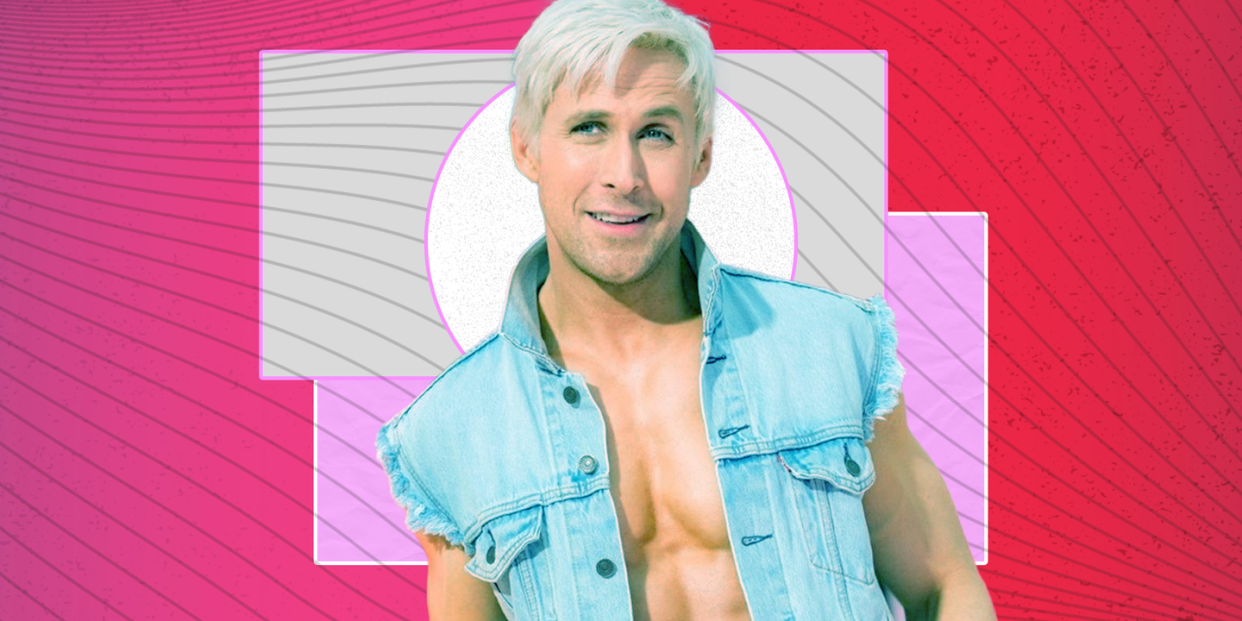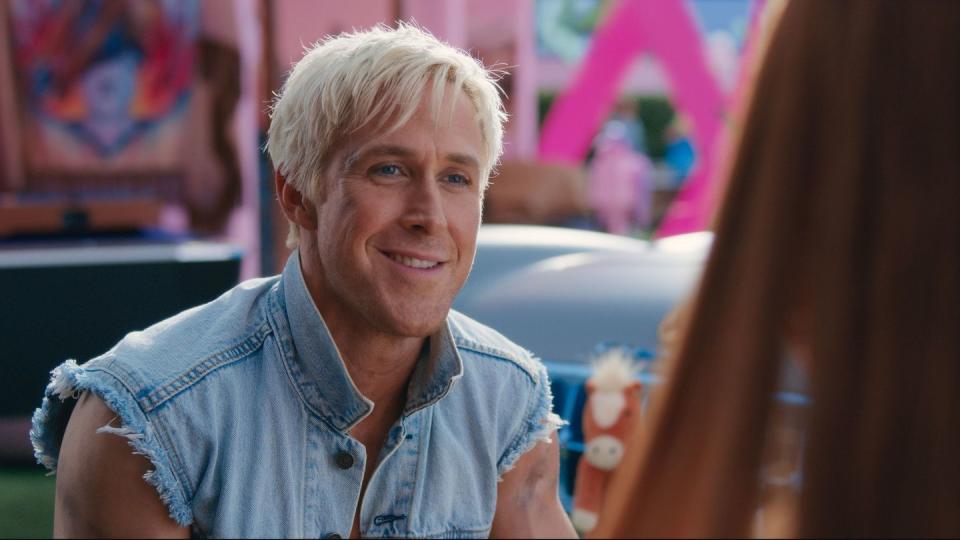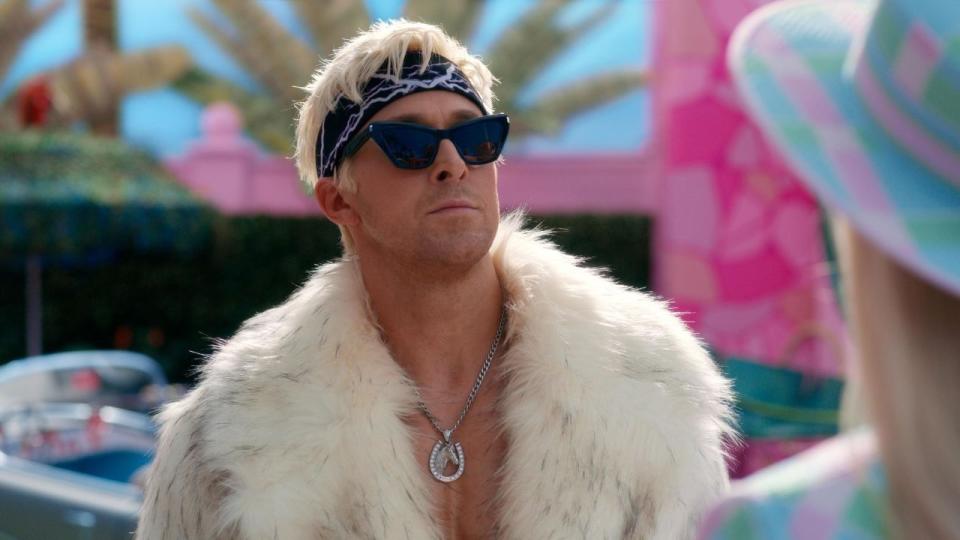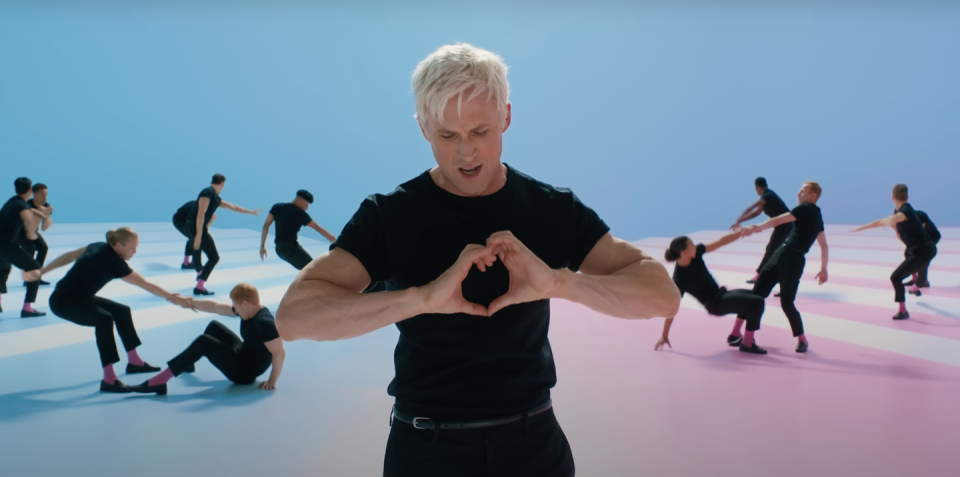‘Barbie’ Has a Lot to Say About Men. But It’s Not Anti-Male.

- Oops!Something went wrong.Please try again later.
- Oops!Something went wrong.Please try again later.
"Hearst Magazines and Yahoo may earn commission or revenue on some items through these links."
The following story contains spoilers for Barbie (2023).
IT MAKES SENSE, obviously, that Barbie, the movie, is centered on the story of Barbie, the toy. Duh. What comes as a surprise in Barbie, though, isn't necessarily the existential crisis that its titular toy/character goes through—the marketing already made it abundantly clear that things would be heading in that direction. No, what comes as a real surprise is the journey of self-discovery that Ken—Barbie's male companion, primarily played here by Ryan Gosling—goes on throughout the course of the movie.
One of the biggest draws of Barbie is the fact that, while, yes, this is a movie based on a toy that could conceivably be seen as a typical cash grab, it's co-written and directed by Greta Gerwig, whose films come along with a penchant to look deep into the human condition. Her last two projects, 2017's Lady Bird and 2019's Little Women, both earned Oscar nominations, giving depth to far more than just the female characters at their center. Look, there wasn't this level of discourse around Transformers: Rise of the Beasts (another movie that came out this summer based on a toy). That's not a coincidence.
Barbie (Margot Robbie) is the film's main character, yes. But it's Gosling's Ken who has the film's most significant arc, going (minor spoiler alert!) from a subservient and standoffish male companion whose occupation (vocation may even be a more apt term) is just "beach" to a heightened version of a pushy, needy boyfriend, to... well, something entirely different by the end of the movie. He is Ken. And as the sweatshirt says, "He is Kenough."
The problem, here, seems to be that a certain subset of Barbie's audience seems to be confusing growth with weakness. And that's not anyone's intention.

Let's put it bluntly: the Barbie movie isn't "anti-man," as some conservative pundits have claimed. It's neither "one of the most woke movies" nor a "flaming heap of garbage," as Ben Shapiro put it in a Tweet. In fact, publications like Vulture have even argued that Barbie, for all of its social commentary and messaging, doesn't go far enough.
What Barbie is, however, from start to finish, is a clever and well thought out satire. A reminder for those who don't know: "satire" is an attempt to use characters or ideas in a heightened way in order to make a point. So in the way that Barbie uses its characters, whether they be Barbies, Kens, or Mattel Toy Executives, it's ultimately writers Gerwig and Noah Baumbach making a joke and commentary on something reflected in our real world.
Ken, who's spent his entire existence in a world where he only has any semblance of a good time when Barbie acknowledges him, suddenly finds out of a world where men have all the power. He finds a place where the "Kens" aren't the second-class citizens, but the ones who call the shots and drive the culture. The word "Patriarchy," to Ken, is a game-changer.
Ken begins to understand the typical pillars of the male experience: movies, sports, Sylvester Stallone in cool outfits, and horses. Lots and lots of horses. He brings his findings back to Barbieland, believing he's found the way things "should" be.

Ken's arc isn't meant to take men, broadly, down a peg. Rather, it's meant to mirror the path that many men go on when they, themselves, become cognizant of the idea of a male-dominated society. Men grow up and as they become more aware of their surroundings, go from a naive innocence to thinking they need to act a certain way, or be interested in a certain thing. Because this is "the way it is," there are inherent expectations that a certain role needs to be filled.
But even Ken comes to the realization that it doesn't have to be this way. Ken has no identity outside of Barbie, and that's something he only actively realizes at the end of the film, but has been slowly working through all the way here. Whether he's running into a wave he can't handle or sneaking in the back of her convertible on a ride to the real world, Ken has been searching for purpose. And in coming to the conclusion that rather than "It's Barbie and Ken" he needs it to be "It's Barbie and It's Ken," he realizes that he—and the other Kens—can easily find themselves in Barbieland. They just have to understand who they, themselves, are.
It's worth looking to the film's musical moments as well to see a point further being made. Gosling has two songs in Barbie, and while they can be seen as an opportunity to show off his wonderful singing voice (wonderful!) and potentially net him a second Oscar nomination (for Best Original Song, in addition to the Best Supporting Actor nomination that he should have on lock), they also do something that musical moments within movies don't often do: reflect on the arc being told.
The first song, "I'm Just Ken," is, ostensibly, the movie's version of a Disney Villain Song. He starts, expressing frustration in his world with lines like "Doesn’t seem to matter what I do// I’m always number two," before eventually busting into the chorus:
I’m just Ken
Anywhere else I’d be a ten
Is it my destiny to live and die a life of blonde fragility?
He wails the words with passion. Gosling isn't just feeling for the life and love that Barbie and Barbieland isn't giving him, but making the case that he wants more out of life. Discovering "Patriarchy" briefly patches this up because he feels a sense of power... but it doesn't last. Even when the Kens are in power of Barbieland, they still desperately want the approval of the Barbies, to the point where it’s essentially what defines them.

Gosling's Ken gets even further into this when he begins his gravelly cover of Matchbox Twenty's "Push," a sequence that's one of the true highlights of the film. Yes, it's Gerwig taking an easy opportunity at a "Dude with a guitar singing at a girl" joke, but Rob Thomas' lyrics actually speak quite closely to what's going on at that point in the movie.
The song's first verse dives right into Ken's insecure headspace:
Said, I don't know if I've ever been good enough
I'm a little bit rusty, and I think my head is cavin' in
And I don't know if I've ever been really loved
By a hand that's touched me, and I feel like something's got to give
And I'm a little bit angry, well
By the time he busts into the chorus, we're seeing the insecurity that the film has displayed—with the insertion of a patriarchy and the erection of Ken's Mojo Dojo Casa House—in musical form, as Gosling's Ken and the others belt out Matchbox Twenty.
I wanna push you around, well, I will, well, I will
I wanna push you down, well, I will, well, I will
I wanna take you for granted, I wanna take you for granted
Even when Ken is "on top," he's clearly not at his best. There's longing in this Ken.
By the end of the movie, when Barbieland is reinstated back into the way it was, Ken isn't any weaker or stronger than he was at the start of the movie. But one thing he is, is more aware of the world around him, how he fits into it, and how, in the future, he can fit into it. And that's something that doesn't hurt any man to think about.
You Might Also Like

